Bookstores are as much an experience, a community space in which stories are shared, as they are mercantile enterprises. The most telling example of this is a conversation that happens with some frequency in Jane Addams Book Shop, a well-known used bookstore on Neil Street in downtown Champaign. I got to witness an instance of this conversation recently. It went something like this:
A customer walked in and asked Susan Elmore, the co-owner of the store, “How is the cat doing?” A look of exasperation and laughter crossed her face before she calmly explained that the store doesn’t, nor has it ever, had a cat that roams the stacks.
“I swear there was a cat here!” the customer said.
“Nope. There was another bookstore that had cats, but it closed years ago,” Elmore responds.
“I swear I was here a few weeks ago and saw a cat.”
“We haven’t had a cat the entire time we’ve owned the place.”
“How long have you been here?”
“Six and a half years.”
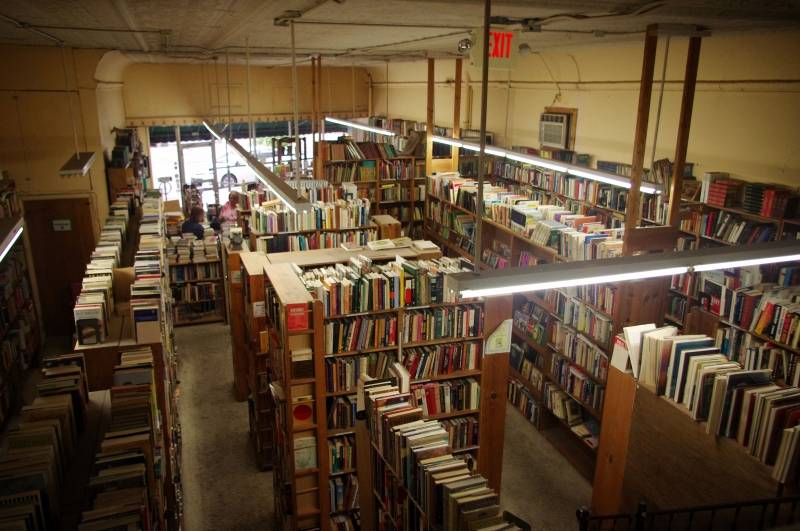
It is exactly this kind of history that is so intriguing about bookstores: they carry a resonance with people as palaces of narrative. They are the sanctuary where people go to learn, to escape, to explore. Used bookstores in particular carry a cultural weight since their products tell two stories: the story contained by letters on the page and the story of the book’s own history – its owners and places the book has been. Perhaps no one is as steeped in this perpetual stew of experience as the people who buy and sell books. They are the unsung heroes of the art of book writing. Authors and even publishers are often referenced as the carriers of literary honor, but it should be acknowledged that it’s the booksellers who distribute, spark discussion, and open environments where culture is made.
I wanted to get to know the people behind this industry, so I stopped by Jane Addams Book Shop, usually shortened to Jane Addams. It’s a labyrinth of rooms large and small, each stuffed to the breaking point with books. Between the shelves, carts, and haphazard piles, there are some 100,000 books contained within the building’s three stories. Originally a feminist haven in the Chicago Loop, the Champaign store opened in 1984, where the book collection has grown larger and the various nooks and crannies, saved for customers trying to find a good read, have grown more comfortable. In 2009, the store found its way into new hands, the Elmore family.
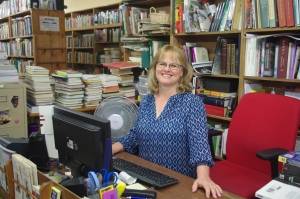
At a table that – I can’t make this up – stood on legs made from books, I talked with the matriarch of clan Elmore, a former nurse at Carle Foundation Hospital. She’s a comfortable conversationalist, sitting cross legged and reclined, sipping fair-trade coffee. She caught me off guard within the first 15 seconds of speaking to her. I asked her how she came into owning the store. She smiled and said “I tell people I was drunk. Kinda sorta.” Needless to say, Elmore elaborated by telling the story of a few cocktails at a former bar called Boltini’s with the former owner’s son in which she told him “If your mom ever wants to sell that store, I would love to own it.” It wasn’t the candid storytelling that most defined the conversation I had with her, though. I was most struck with the way she constantly acknowledged what she thought drove the business: her family’s work at the City of Champaign, her unbridled respect for their assistance, and her own unyielding love of books. I asked her to elaborate on some of those areas.
SP: You seem to really have a soft spot for downtown. Do you work with other organizations and businesses?
Elmore: We’re part of the Champaign Center Partnership. My husband is on the Planning Commission for Champaign. We live about a mile from here, so we’re big on the “buy local” movement. We’re big farm-to-table people. My husband is also on the Land Connection Board. He’s a big volunteer for those kind of things. We’re both big volunteers for those kind of organizations.
SP: What would you say is the biggest difference between working, managing, and owning a small business versus working in a larger organization?
Elmore: There’s a lot. I was a managing nurse for most of my career. The biggest thing is: there are no policies and procedures here. We do what we want to do. Other than my daughter-in-law we have one full time employee and we always have what we call a “minion.” We always have a young man or young woman who does shelving and stocking. We always ask permission to call them that when we hire them. You know, pretty much, we can do what we want. We have to follow legal stuff, like laws of payment, obviously. So pretty much, you can do whatever the heck you want. The only downside is with the benefits of a big company. We try to be good to our employees. It’s mostly family anyway.
SP: Is it challenging to work with family?
Elmore: You know, it’s been extremely easy. Especially because it’s with my daughter-in-law! I say it’s because I’m a wonderful mother-in-law, but that’s just my explanation. Surprisingly, it’s been really, really good. She has a three and a half year old and when she had him, we changed her hours so she could take care of him, so he could come in here. It’s been really nice to be able to do that and to support them. You would think there would be a lot of challenges but it’s been really good. She’s excellent at what she does here so we’ve really had no problems.
SP: I’m curious. You’ve had this place for six and a half years. Do you have a favorite memory or an interesting experience with the people that flow through here?
Elmore: I can’t think of a particular one, but so many people have so many passions about a particular subject or a particular author and they want to talk to someone who shares that interest. This means I learn stuff constantly from the customers. They’ll ask for a book and I’ll ask them about the book and they’ll start telling me everything. It was hard at first because I felt like I had to know everything. And I know nothing. There are a million books. I can’t possibly know that much about them. So every single day I learn about authors and subjects and books. I can’t think of a particular thing but that’s been the fun part.
Elmore finished the conversation with a quote that I won’t soon forget. I asked her what she would say to a large group of people. After some considerable thought, she said “Don’t be ashamed of what you read. Don’t think ‘I should read a classic as opposed to science fiction.’ If it gets you reading, if it gets your imagination going, then read it.” I found the same attitude across town at another well established bookstore, Priceless Books in downtown Urbana.
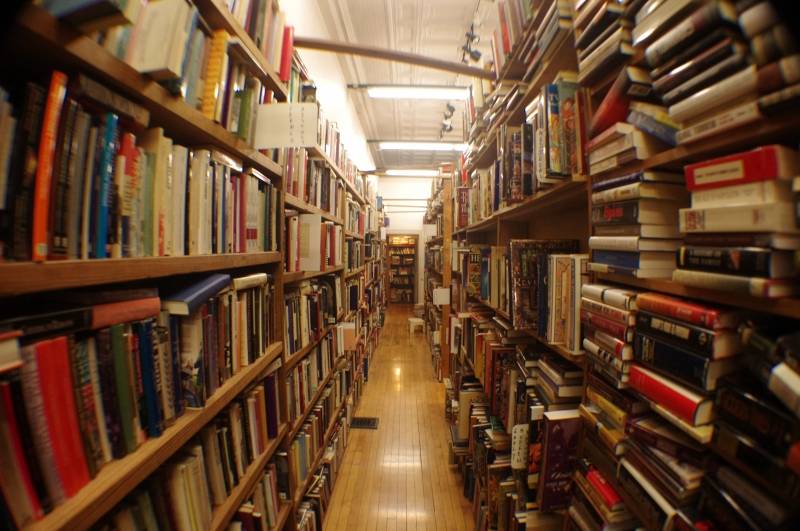
Founded in 1993 by business partners Bill Thorhnill and Mike Vaillancourt, Priceless Books could easily be missed if you’re in a rush. With an unassuming oak door recessed a few feet from the pavement, the store is packed with books. Having downsized in a move from the building next door three years ago, shelf space seems to be a luxury. Nine foot shelves run the length of the store, containing over 30,000 books and 8,000 recordings. The rows are cramped, but far from uncomfortable. The density of books serves as a reminder of the variety of books available and the ever wider variety of people shuffling past each other to find a good book.
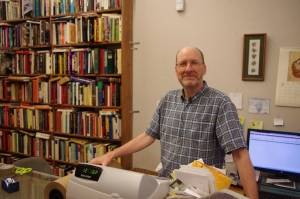 I sat down with Vaillancourt, half of the team that owns and runs the store. A slightly gaunt man who looked up at me through wire framed glasses, he spoke thoughtfully, often pausing to think through his responses to questions. It was clear from the beginning he was an academic – he and his business partner both completed graduate work at the University of Illinois. It was easy to see when he was thinking of his regular customers at the store because his eyes lit up and he smiled wide. He referenced a few times the feeling of working within a community and having a group reliable customers.I wanted to know more about those relationships, so I asked him to elaborate on his experience owning a business for so long:
I sat down with Vaillancourt, half of the team that owns and runs the store. A slightly gaunt man who looked up at me through wire framed glasses, he spoke thoughtfully, often pausing to think through his responses to questions. It was clear from the beginning he was an academic – he and his business partner both completed graduate work at the University of Illinois. It was easy to see when he was thinking of his regular customers at the store because his eyes lit up and he smiled wide. He referenced a few times the feeling of working within a community and having a group reliable customers.I wanted to know more about those relationships, so I asked him to elaborate on his experience owning a business for so long:
SP: So in 23 years, have you noticed any trends in the customers. Were there times with a lot of customers? Is there a particular kind of person that comes to your store?
Vaillancourt: We do a lot of business with the University community, whether it be faculty or grad students or undergrads. They probably make up the core of our customer base. The overall trend is, though, is for less people to come in now. I think we hit a peak in the early 2000’s. That probably was our high point of customer traffic. It grew for about ten years and for the last ten or so years, it’s slowly fallen off. You can speculate as to why that is. I think that there is a lot of books on the internet. I mean, I buy books for myself on the internet all the time. Of course, there are other formats now that compete with books. I do think books are going to be around for a long time, to have their own place in the market. I don’t think there’s any question that e-books have had some impact on business.
SP: What are your collections like? How do you come into new books?
Vaillancourt: People sell them to us. They just bring them in like this fella just did. (A man had just set a large box of books and DVDs on the counter.) I’ll pay them, or go through them and decide what I want. Since he’s a regular I know he’ll probably take what I offer. That’s the way we get our books. When we first started out, we used to go to estate sales. We found those to be rather irritating – very highly competitive, with people elbowing each other. After a while, we had enough material coming through the door that we don’t have to do that anymore.
SP: What do you think the most rewarding part of the endeavor is?
Vaillancourt: For me, it’s just the idea that we’re offering the community something that it can’t get anywhere else. We’ve got a lot of books here that are hard to find. We’ve got about 8,000 CDs right now. So we’re really offering something that people in the area can’t get anywhere else. Since we’re still in business I think people are responding to that. I think that’s what I like best about it – that we’re actually making a contribution to the local society.
SP: So you said that owning a bookstore is something you’d talked about for a long time. How did you actually go about getting into the business?
Vaillancourt: Well you won’t’ believe this but we found a book on how to open a used bookstore, believe it or not. We actually followed a lot of the advice. Much of it was foolish, as we found out. A few bits were useful. The first thing was that we needed to find a space – it took quite a long time to find a space that we wanted. Once we found that, we started collecting books. It took us a few months to get enough where we thought we could actually open and have enough stocked and have a viable store. The whole process took about six months, finding a space, finding books, and a few other minor things like that.
The most memorable moment when talking to Vaillancourt was his one of his shorter responses to a question I asked. I asked him what the largest challenge he faced after over twenty years working with his partner. He stroked his chin and thought for a moment. He turned to me and said, perfectly straightforward, “Selling enough books.” Then he cracked a smile and we both had a good laugh.
Between speaking with the owners, learning the histories of the stores, and watching the streams of readers coming into these stores, I’m coming to realize exactly what these local landmarks can teach us. Primarily, Priceless Books and Jane Addams Book Shop are driven, each in their own way, by a passionate desire to serve the people of Champaign-Urbana. By providing a community space, these stores are doing more than just offering books; they provide a shared experience. That’s the beauty of used books, after all. The story about the book – or the bookstore – can be just as interesting as the book.
If you’re interested in visiting either of these stores, Jane Addams Book Shop is located at 208 N Neil St, Champaign and is open Mondays from 10 AM to 5:30 PM, Tuesdays through Fridays from 10 AM to 7 PM, Saturdays from 10 AM to 5 PM, and Sundays from 12 PM to 5 PM. Their website is janeaddamsbooks.com Priceless Books is located at 108 W Main St, Urbana and is open Mondays through Fridays from 12 PM to 7 PM, Saturdays from 10 AM to 5 PM, and Sunday from 12 PM to 5 PM.
Andrew Adams is a recently christened adult, with a penchant towards the blending of arts, sciences, and plant-derived stimulants mixed with milk and a shot of Hazlenut. He can be reached by email and on Twitter – fair warning: that account is known for politics and snark.








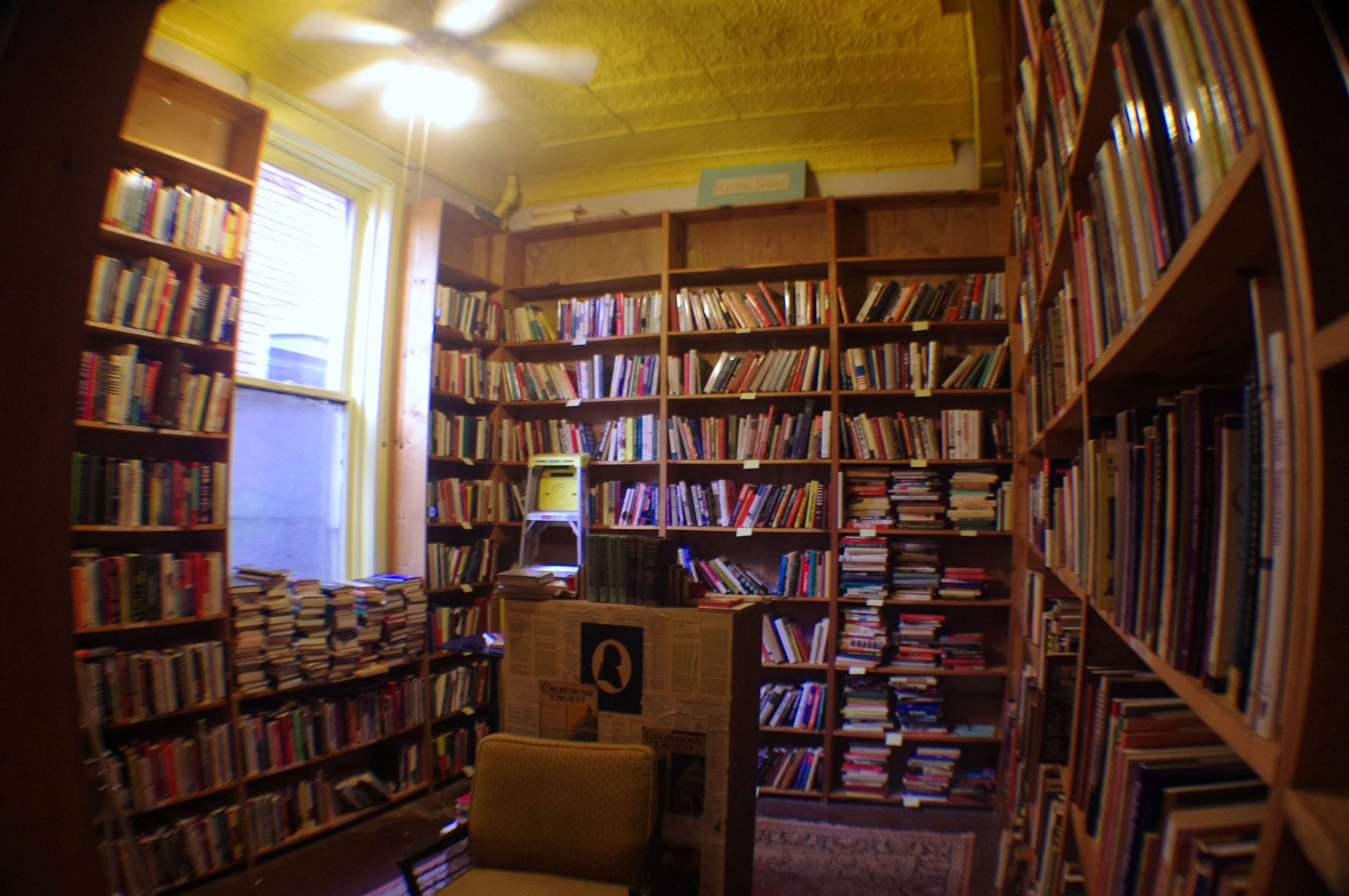
 Andrew Adams is a recently christened adult, with a penchant towards the blending of arts, sciences, and plant-derived stimulants mixed with milk and a shot of Hazlenut. He can be reached by
Andrew Adams is a recently christened adult, with a penchant towards the blending of arts, sciences, and plant-derived stimulants mixed with milk and a shot of Hazlenut. He can be reached by